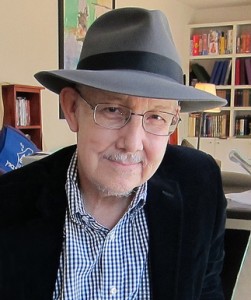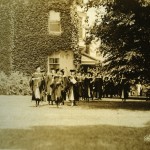The writer, critic, and literary scholar D.G. Myers died September 26 at the age of sixty-two, almost seven years to the day after he was diagnosed with metastatic prostate cancer. David wrote about his illness as he wrote about books and his faith–incisively, forthrightly, with vast knowledge, and without self-pity. In August, David wrote in an email: “When someone replies to me, ‘We’re all dying,’ as if to relieve my mind, I want to punch him.”
As many of you know, David joined Good Letters, the blog from Image journal, a few months back and wrote several posts about his experience with cancer, some of which were shared widely.
Click here to find a link to all seven posts David wrote for Good Letters.
Click here for David’s “A Commonplace Blog.”
We’ve invited a group of David’s friends, old and new, to participate in a tribute to his life and work. Two themes unify the following tributes and remembrances: while few of the contributors met David in the flesh, all felt welcomed into his world; and the bond they forged transcended politics, religion, and literary tastes. To know David was to be challenged and rewarded.
Because the response to our request was overwhelming, we can only post a few of the responses here today. When we’ve created web pages at the Image website with all of the tributes, we’ll let you know.
—Patrick Kurp and Gregory Wolfe
Darin Strauss
If you judge friendship by warm admiration—as opposed to by the calendar; or by in-person meetings—D.G. Myers is my friend.
We met in an unusual way; a fight. Maybe that’s not so unusual, for literary people. I wrote something in the Times that referenced him. Unfairly, he thought. I disagreed with him. This resulted in that least-civilized, most embarrassing (in retrospect) thing: a long Twitter fight.
It dragged. Somehow, bits of our sympathetic temperaments began to poke through the 140-character animosity. Before long, we were fond acquaintances. Weeks of occasional social-media nods of the head. And then the tenor of our messages changed, got more personal; I sent him a memoir I wrote about grief; he shared some private thoughts he had about his illness, and one day—as he put it to me, “we are friends.”
I have sat in dumbstruck admiration at the honesty of his recent writings on cancer; at the steadfastness of his unsentimental faith, yes, but more at the unsentimental intellection, the brilliance of his almost Tolstoyan insights. He is a powerful and powerfully brave thinker, and I’m more than glad we got to know each other.
Darin Strauss is author most recently of Half a Life, which won the 2011 NBCC Award for memoir/autobiography.
Christopher Beha
David’s enthusiasm for my first novel was so persistent it became something of a joke around the literary twittersphere. The umbrage he took each time the book failed to appear on a short list for some prize or an end-of-the-year “best books” rundown was flattering, of course. But what a writer really wants, even more than to be praised, is to be understood. When David reviewed my novel I got the one thing young novelists are told not to expect in the current culture climate—not a thumbs up, a pat on the back, or a letter grade, but extended attention from a knowledgeable and discerning critic who has taken the time to consider what you’re trying to do and is in position to judge whether you’ve done it. It was, I can say with no exaggeration, the highlight of my career to that point. I wrote to David to tell him as much, and from that starting point a friendship developed. Like many of the friends who are memorializing him now, I never met David in person and I exchanged notes with him about little besides books. But if you are among the people who believe that books are a large part of life and that the word can convey a good deal of the self—as I am, and David was—there is no reason to treat such a friendship as anything less than real. Certainly the loss of it feels real to me.
Christopher Beha is the author of Arts & Entertainments (2014), What Happened to Sophie Wilder (2012) and The Whole Five Feet (2010).
John Wilson
Like Samuel Johnson, David Myers was not a clubbable man, but he was the best of friends. Our friendship took place almost entirely under the umbrella of Twitter (where Doctor Johnson also would have flourished), yet in a lifetime blessed with friendship his was among the most precious to me.
There’s a famous portrait of Johnson reading, gripping the book close to his face, as if determined, by the sheer intensity of his attention, to extract its every nuance, to plumb its depths, to know it. David read that way, and yet, like his great predecessor, he was a genial reader, as quick to laugh (often at himself) as he was to issue praise and blame.
Of course David was also unlike Samuel Johnson in countless ways, and the comparison doesn’t begin to comprehend the man. Like each one of us, he was one of a kind. My hope for him—foolish as it may seem to many—is that he is even now basking in the light of the Father of us all, and that someday, under the larches of paradise, he and I can continue the conversation that has been so brutally interrupted.
John Wilson is editor of Books & Culture.
Terry Teachout
David Myers was a tough critical customer. He took no reputations at face value. All he cared about is the quality of the art object itself, and he applied his standards rigorously and unflinchingly. But that makes him sound like something other than what he was, a thoroughly decent man of deeply humane values who looked to literature for that which great art is uniquely well suited to provide: beauty, clarity, consolation, truth. I in turn looked to him for critical guidance, confident that whatever he recommended will be worth reading. We didn’t always agree, but I knew I could always take him seriously. That knowledge is a blessing.
Terry Teachout is the drama critic of The Wall Street Journal and critic-at-large of Commentary. He blogs at About Last Night.
Marly Youmans
What struck me first about David Myers was how lively and opinionated he was—one of those lovely people whose words are so spilling over with thought and life that it is hard to fathom how such language could ever stop. While I knew his reviews and so had a sense of his mind at work, I encountered the whole man (the father, the husband, the teacher, the critic) through editor John Wilson in the interesting land of Twitter. Not long afterward, he wrote a wonderful review of a book of mine. His words surprised me because he wrote about spiritual aspects of the book that no other critic or reviewer had ever discussed. I am fond of his reviews and essays and online banter; David Myers had the courage to inspect subjects that are overlooked, unfashionable, or not politically correct. Even there, he moved lightly among serious topics, taught with humor and could remain playful.
Marly Youmans is a poet and novelist, author of Glimmerglass (2014) and A Death at the White Camellia Orphanage (2012).
Alexander Nazaryan
I never met David, but I knew him in the way one often knows people these days: through the Internet. There, he proved himself a fearless and capable defender of great literature. In a domain of sheep, he was a lion, leaving poor prose in shreds, extolling work that deserved more attention than it was getting. He sought not retweets but respect. He certainly has mine.
Alexander Nazaryan is a senior writer at Newsweek. He was previously on the editorial board of the New York Daily News, where he founded and edited the Page Views book and culture blog.
Erika Dreifus
For me, one of the great benefits of social media—Twitter, in particular—will remain the opportunity it gave me to get to know David and his work. Even as I write these words, I hesitate, as I often did when responding to one of David’s online remarks. David set the bar for knowledge, honesty, and incisive insight oh-so-high. “Will my words be worthy enough to fall beneath his keen eyes?” It’s a question I’ll continue to ask myself. And I will continue to think of his wife and children, whom he loved so very much.
Erika Dreifus is the author of Quiet Americans: Stories (2011).
Frank Wilson
I didn’t know David Myers personally, but often, reading him, I felt as if I did. His literary criticism was the genuine article—passionate engagement with substance and its corresponding style, precisely as these served life. But it was as a person of faith that David was truly—and most exactly—exemplary. His expressions of faith were transparently authentic: He lived his faith. His courage in the face of encroaching death was nothing short of extraordinary. That, in particular, will stay alive in my heart. I don’t think he would mind my offering in his memory the prayer we Catholics say at such times: Eternal rest grant unto him, O Lord, and may perpetual light shine upon him.
Frank Wilson retired as book review editor of the Philadelphia Inquirer and operates the blog Books Inq.–The Epilogue.
Janice Harayda
D.G. Myers was one of God’s Chosen People. I spent years teaching a Sunday school class for the children of Episcopalians, often called “God’s frozen people.”
But on Twitter I could talk to David about faith—and its intersection with literature—more easily than to any of my co-religionists. He had several traits that made our conversations not just possible but a joy: He cared, he listened, and if he was devoted to Orthodox Judaism, he was never parochial but defended Catholic and Protestant writers as ardently as Jewish ones. Above all, he had the moral courage to refuse to allow himself to be defined by Twitter or—it was clear—any other medium. He defined himself. You never had the sense with David that he was dumbing himself down. If he had an idea too large for 140 characters, he would let fly dozens of tweets rather than oversimplify: He would be the leaven in the digital loaf. And he had the erudition and verve to pull it off. In an age in which literary criticism—and conversation of any sort—grows ever more fragmented and insubstantial, it was a privilege and an inspiration to have observed a life so faithful to the spirit of Ecclesiastes: “Whatsover thy hand findeth to do, do it with thy might.”
Janice Harayda is a critic, novelist and editor-in-chief of One-Minute Book Reviews.
Allison Lynn
I first got to know David Myers three years ago on Twitter, when he and I disagreed over how the literary community should deal with gender inequality on book lists. I didn’t immediately follow him after that tweet exchange—we had clearly different biases in this area and many others – but he kept coming back. He made excellent suggestions when I was looking to expand my Charles Johnson bookshelf. He appeared like magic in my feed each time I even alluded to Philip Roth. We bonded over a shared passion for Dana Spiotta’s Stone Arabia. Yet it’s not the details of our exchanges that stand out when I think over what became a sort of friendship between us. It’s what I learned from his willingness and impish eagerness to engage with people who didn’t necessarily share his opinions or his beliefs. I came to see that it wasn’t argument he was after in these engagements—at least in my experience—but common ground. And whether we were disagreeing or (often, it turned out) agreeing, I left every exchange with David feeling better about myself. I know that that’s a strange tribute to make to another person. But the generosity with which he treated my opinions on literature—and then the seriousness, on his blog, with which he reviewed my own recent novel—felt like a true honor. And the seriousness with which he treated reading and literature as a whole makes the entire endeavor of writing a little more worth it.
Allison Lynn is author of The Exiles (2013) and Now You See It (2004).
Micah Mattix
If I wanted to know whether I should give a novel a shot or not, the first place I’d go was D.G. Myers’s blog. He had his blind spots—we all do—but his judgment rarely disappointed. Even if he disliked a book, his writing was such that I could tell if I might enjoy it. That’s because the focus of his posts was always the novel, the writing, never his judgment.
And he was a pleasure read—specific, concrete, open to possibilities, but never enthralled with style for style alone. Considering Nabokov’s minutia, he asks: “How much of human life disappears into oblivion like this?” Charles Portis’s fiction, in a nutshell, is that “The difference between ‘independent thinkers’ and full-out crackpots is thin.” And on Marly Youmans’s latest novel, he wrote: “Youmans knows better than anyone that, for the peripatetic outsider, who feels as if he must keep moving, home is not without its costs.”
David wrote about fiction not to advance himself or his career, but because he loved it and because it was part of life. It’s hard to be both forceful and humble. David could.
David and I never met. We corresponded by email and kept up with each other on Twitter. I knew him mainly through his writing, and it’s a tribute to his intellect and skill that I feel that this was almost enough.
Micah Mattix is an assistant professor of literature and writing at Houston Baptist University and a senior contributor at The American Conservative where he edits Prufrock.












